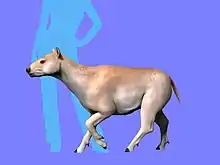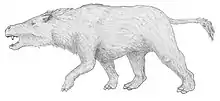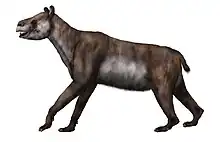| Albertogaudrya | |
|---|---|
 | |
| Albertogaudrya unica | |
| Scientific classification | |
| Kingdom: | |
| Phylum: | |
| Class: | |
| Order: | |
| Family: | |
| Genus: | †Albertogaudrya[1] |
| Species | |
| |
Albertogaudrya is an extinct genus of astrapotherian mammal that lived in present-day Salta, Argentina (25°48′S 65°24′W / 25.8°S 65.4°W, paleocoordinates 28°12′S 55°54′W / 28.2°S 55.9°W) during the Eocene (Casamayoran SALMA) 48.6 to 37.2 million years ago.[4][5][6] Fossils of Albertogaudrya have been found in the Lumbrera and Sarmiento Formations.[4] It is named after French palaeontologist Albert Gaudry.
Species
A. carahuasensis differs from A. unica in having smaller premolars, with m1 having longer talonid and wider trigonid, p3-m1 with shallower external sulci and lacking cingulae, and less curved hypolophid.[3] A. carahuasensis is known from a fragmentary mandible.[6]
References
- ↑ Albertogaudrya in the Paleobiology Database. Retrieved 3 March 2013.
- ↑ Albertogaudrya unica in the Paleobiology Database. Retrieved 3 March 2013.
- 1 2 Albertogaudrya carahuasensis in the Paleobiology Database. Retrieved 3 March 2013.
- 1 2 Albertogaudrya at Fossilworks.org
- ↑ "Pampa Grande, Salta, Argentina (Eocene of Argentina)". Paleobiology Database. September 2004. Archived from the original on 2013-04-03. Retrieved 3 March 2013.
- 1 2 Carbajal et al. 1977
Bibliography
- Ameghino, Florentino (1901). "Notices préliminaires sur des ongulés des terrains Crétacés de Patagonie". Boletín de la Academia de Ciencias en Córdoba. 16: 349–426. OCLC 123174974.
- Carbajal, E.; Pascual, R.; Pinedo, R.; Salfity, J. A.; Vucetich, M. G. (1977). "Un nuevo mamífero de la Formación Lumbrera (Grupo Salta) de la Comarca de Carahuasi (Salta, Argentina). Edad y correlaciones". Publicaciones del Museo Municipal de Ciencias Naturales de Mar del Plata Lorenzo Scaglia. 2 (7): 148–63. Retrieved 3 March 2013.
This article is issued from Wikipedia. The text is licensed under Creative Commons - Attribution - Sharealike. Additional terms may apply for the media files.
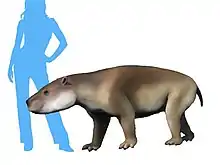
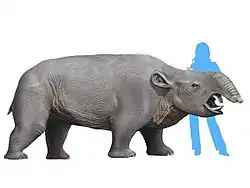

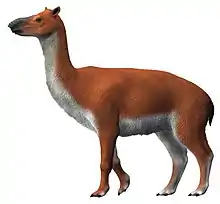
.jpg.webp)
